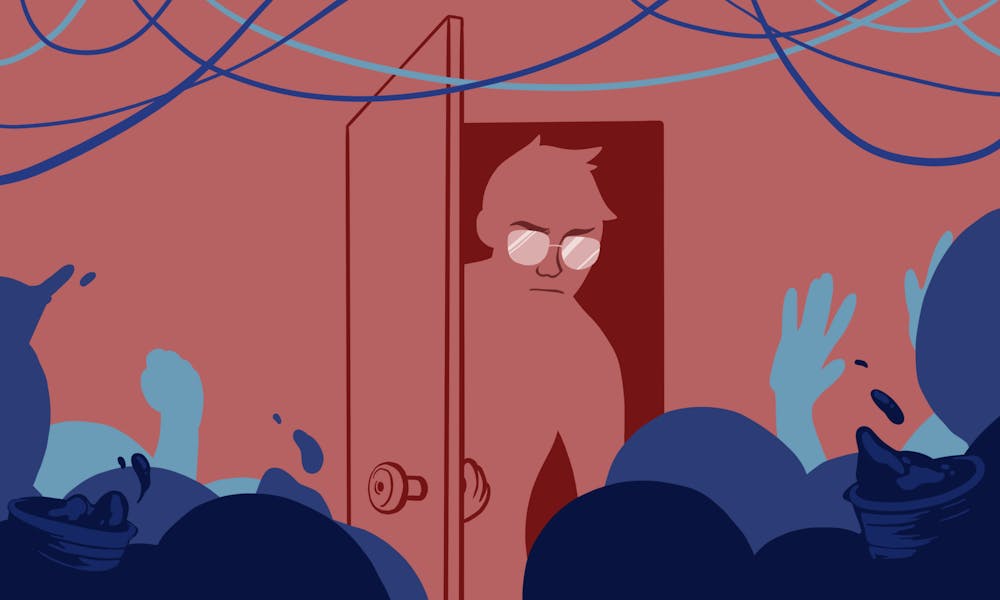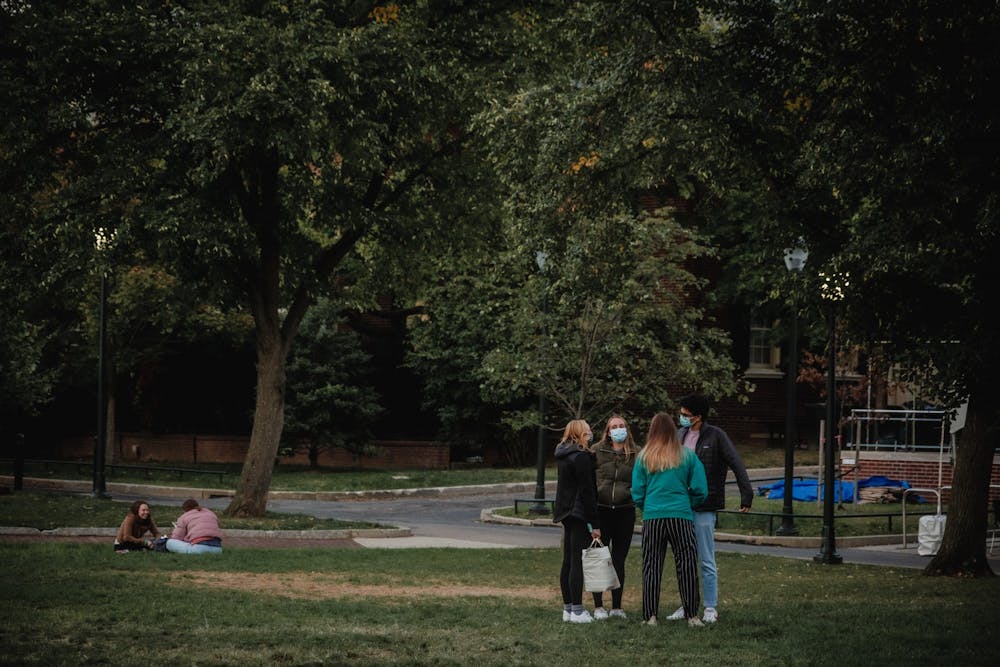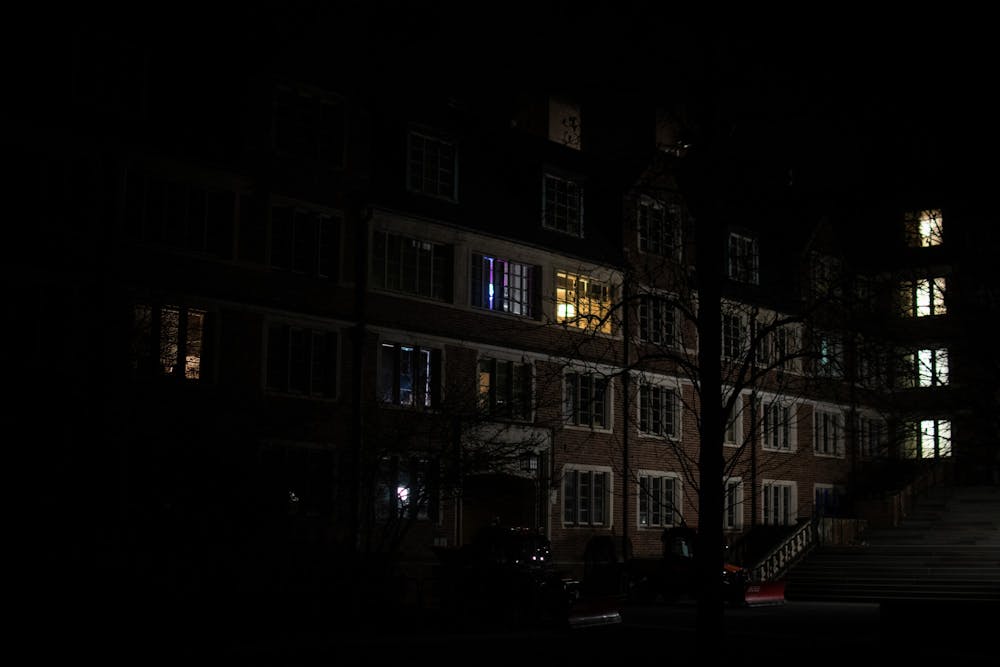
Only a week into the start of the spring semester with students back on campus, some College House residential advisors and graduate associates have been pushed to their breaking point.
Following numerous unmet demands from RAGAs dating back to spring 2020 — including increased compensation and modified contracts in light of the pandemic — RAGAs are now reporting that they feel unsafe enforcing the Student Campus Compact, adding that they are not comfortable putting themselves in danger of contracting the virus without getting vaccine prioritization, hazard pay, or more frequent COVID-19 testing.
Burdened with increased responsibilities due to COVID-19
A second-time Fisher-Hassenfeld RA and College junior, who requested anonymity for fear of retaliation from College Houses & Academic Services, said RAGAs have experienced an increased workload due to restrictions placed on college house residents to limit the spread of the virus. She said RAGAs are now responsible for breaking up student gatherings and enforcing the Campus Compact, and that she has broken up around seven to 10 gatherings since on-campus residents first moved in less than two weeks ago.
“It’s supposed to be 15 to 20 hours [of work] per week. I’m probably doing 25 to 30 — maybe more,” she said. “I haven’t had a day this week where I’ve gone to bed before 1 a.m.”
Some RAGAs have reported seeing first years partying and gathering in college houses, swiping in students who do not reside in the college houses with their PennCards, and entering communal areas in the college houses without masks on.
"It's kind of ridiculous that they expect us to do in-person duty shifts and deal with incidents with residents that don't have masks on," the second-time Fisher-Hassenfeld RA and College junior said about this semester. "I've had multiple incidents where a resident answers the door without a mask on, and we've had people test positive in my college house."
With the increasing number of RAGA resignations causing a shortage in workers, she said that nightly duty shifts take much longer.
However, Deputy Provost Beth Winkelstein wrote in a Jan. 27 email to The Daily Pennsylvanian that while some RAGAs decided not to work during the fall 2020 or spring 2021 semesters, since fewer residents are on campus, the ratio of RAGAs to residents is the same as prior full occupancy years. For some houses, she wrote the ratio is even smaller, with each RAGA supporting fewer residents.
"We are really pleased with the support our RAGAs have been giving to their residents virtually and in person — and that collectively we are able to give each resident personal attention during this challenging time," Winkelstein wrote.
Unlike in previous semesters, the second-time Fisher-Hassenfeld RA and College junior said RAGAs were expected to attend "random trainings" throughout the fall for topics related to COVID-19 and campus issues. She added that the annual training for RAGAs that takes place in August before the start of the semester was extended from one day to three days with no prior warning.
“[The trainings] honestly felt like busy work, and I don’t feel like I got anything out of them,” she said. “But [this] way, CHAS can say that we were ‘well trained’ in campus resources.”
Second-time Kings Court English College House RA and College senior Mark Lovett said that during training, CHAS recommended that RAGAs only break up small gatherings and avoid large groups of people to prevent putting themselves at risk of contracting COVID-19. According to Lovett, RAGAs are tasked with reporting incidents of large gatherings outside of the college house, but only with reporting the location and time of the incident and not the people involved.

“They tell us not to get involved if we’re in a dangerous situation, so if we see a large gathering outside of our [college] house, we’re not supposed to actually go up and break it up,” Lovett said. “There [are] no actual names taken up, so there’s no real punishment.”
Lovett added, however, that RAGAs in Kings Court English College House have been encouraged by their House Director to break up gatherings of all sizes that violate the Campus Compact and to report the names of the students involved in the incident — regardless of the risk.
"I would say [being an RA] is more risky [now] because the residents don't always wear their masks," he said. "We are kind of on the frontline because we have to expose ourselves while we're on duty. We [have to] break people up. We're in charge of actually telling people to wear their masks. We also have to touch a lot of surfaces on duty, [because] we have to walk around and touch almost every door in the house."
Second-year Penn Law student and former Ware GA Chris Fanick said that RAGAs' ability to enforce the Campus Compact is ineffective, since they are not given the authority to effectively punish students who break COVID-19 safety guidelines.
“I know there is a mechanism for reporting [the Compact], but it’s kind of hard when there are going to be hundreds of groups of students getting together in the dorm every night," Fanick said. "You can’t report all of them for wanting to be around each other.”
RAGAs resign due to College House leadership changes and lack of communication
In addition to concerns about unsafe COVID-19 conditions, many RAGAs resigned at the start of the spring semester, frustrated with recent dramatic changes CHAS made to College House leadership.
Fanick resigned in January after CHAS reassigned his House Dean Amanda Atkinson to work for Penn’s COVID-19 hotline and because he was worried students arriving on campus in the spring would not adhere to the Campus Compact. He said that three of the 14 Ware RAGAs quit after CHAS denied RAGAs increased compensation for the additional risk of working during the pandemic, and did not outline clear enforcement policies for COVID-19 violations in the Campus Compact.
Fanick also criticized CHAS' decision to rename House Deans as House Directors, saying that the change in titles forced Penn House Deans to have to reapply for their positions — leading to two House Deans not getting rehired through this process.
The Quad now has one House Director under the new leadership structure, which he said "feels unmanageable," as Ware, Riepe, and Fisher-Hassenfeld previously each had their own House Dean. Harrison College House did not have a House Dean during the fall semester and instead had a CHAS administrator temporarily filling the role, he added.
"Due to the reduced density of residents in the Quad, the three houses are being handled as a single Whole Quad this semester with the full complement of residential faculty and RAGAs," Winkelstein wrote.
Winkelstein added that there is currently an ongoing search to replace two open positions for House Directors in the Quad.
Due to the change in contracts and a lack of transparent communication from CHAS, many RAGAs also resigned prior to the start of the fall semester.
A College sophomore, who was hired as an RA in Hill College House for this academic year and requested anonymity for fear of retaliation from CHAS if she reapplies to be an RA in the future, said she was forced to resign in the fall semester when she decided not to return to campus and was denied the opportunity to be an RA from home.
RAGAs were permitted to live on campus last semester and held virtual programming for their residents after Penn made the decision not to reopen on-campus housing, she said.
“They had already broken their contract with us by delaying move-in, but they were kind of still holding us to it,” she said. “They said you cannot hold this position unless you live on campus because that’s your form of compensation. They said you don’t really have a choice — you have to resign if you aren’t coming to campus."
In her email of resignation to Hill and CHAS sent in August, the College sophomore said she was looking forward to rejoining as an RA in the future. She said she received a vague reply from both parties that did not clearly state whether she would be rehired in the spring, adding to the confusion RAGAs already felt about whether or not they would be allowed to return in the spring if they did not live on campus in the fall.
After reaching out to CHAS in November to ask if she could continue as an RA this semester, she said she received a brief email response, which said it would not be possible to return and that she should refer to the RAGA Frequently Asked Questions page. Now, the College sophomore said she is unsure whether she will reapply to be an RA for the 2021-2022 academic year.
“The main things that would prevent me from reapplying are the lack of communication, lack of compensation, and the flexibility of the contract,” she said. “When you read the RA contract, [it feels] like this can be changed at any time. It feels very transactional and like you’re at the will of [CHAS].”
RAGAs' demand increased pay and transparency from CHAS
Crumbling under the daily burden of supervising students to uphold campus safety guidelines, RAGAs continue to seek increased compensation and more transparency from CHAS.
A group of over 135 RAGAs signed a letter to CHAS in August demanding they be categorized as “first-responders” in order to qualify for more frequent COVID-19 testing, hazard pay, and an increase in compensation, citing that the work of RAGAs puts them at greater risk of contracting the virus because of frequent contact with student residents and shared communal spaces.
The second-time Fisher-Hassenfeld RA and College junior believes RAGAs are not receiving hazard pay or priority for receiving the COVID-19 vaccine because they are not considered to be essential or frontline workers, since they are compensated for their work with housing and a dining plan rather than paid a salary.
Second-time Riepe RA and College senior Zoe Osborne believes all RAGAs and residents of the Quad, Kings Court English College House, Hill, and Stouffer College House should be prioritized for vaccination because those college houses have communal bathrooms, making it more difficult to completely isolate.
“RAs, as people who are doing a job by being here, should get priority [for the vaccine], but I also really think that the [residents] should,” second-time Riepe RA and College senior Zoe Osborne said. “We should all get vaccinated because vaccination doesn’t really work if it’s just some people [who get it].”

Inside of the Quad at night. Due to the increased stress and health risks of working in dorms, RAGAs are seeking compensation beyond room and board.
Fanick agreed, saying RAGAs should be prioritized for vaccination because they are forced to come in close contact with potential carriers. RAGAs do not get screened for COVID-19 more frequently than other on-campus residents, she said.
A second-time Riepe GA and third-year Ph.D. candidate, who requested anonymity for fear of retaliation from CHAS, said that they respect the University’s decision not to vaccinate RAGAs ahead of frontline workers and those with preexisting conditions.
Like other RAGAs, the second-time Fisher-Hassenfeld RA and College junior emphasized the importance of their role in keeping the Penn community safe amid the pandemic.
“If we left the College House system, the whole College House system would fall apart, which in my definition would make us essential workers," the second-time Fisher-Hassenfeld RA and College junior said.
Staff reporter Abi Murugadoss contributed reporting.
The Daily Pennsylvanian is an independent, student-run newspaper. Please consider making a donation to support the coverage that shapes the University. Your generosity ensures a future of strong journalism at Penn.
Donate







